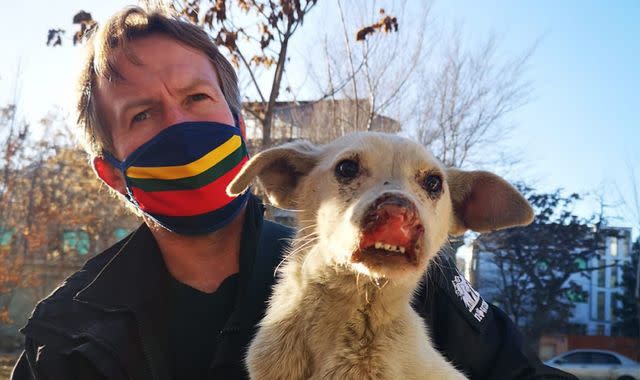Afghanistan: Armed forces minister says 'desperate Afghans' cannot be moved to bring ex-Marine's animal rescue staff to 'front of the queue'

British troops cannot move "desperate Afghans" out of the way to bring a former Royal Marine and staff and animals from his rescue centre to the front of the queue at Kabul airport, a minister has told Sky News.
James Heappey said that while it is commendable that Paul "Pen" Farthing has stayed with his staff and animals until they are evacuated, fast-tracking him through the evacuation process "doesn't feel like the right thing to do".
The armed forces minister told Sky News: "For him, it is a grim reality of these situations that as a British national we would seek to expedite his passage into the airport but he, commendably, has said that is not what he wants to do.
"He is asking us, the Americans and the Taliban for safe passage but I am afraid safe passage is also other words for being brought to the front of the queue.
"And I just wonder how you feel about having to make a decision whereby we move lots of desperate Afghans out of the way to bring him through because of the profile and the support he has. That doesn't feel like the right thing to do. It gives me no pleasure to say that though.
The comments come after the ex-Marine former said he was attempting to evacuate 200 cats and dogs and staff from the Nowzad animal shelter from Kabul.
Since the Taliban takeover in the capital, Mr Farthing has campaigned to have his staff, their families and the animals evacuated in a charter plane in plan he has called Operation Ark.
On Thursday, he called on the Taliban spokesperson Suhail Shaheen to arrange safe passage for his team and animals to their charter flight.
"Can you please facilitate safe passage into the airport for our convoy? We are an NGO who will come back to Afghanistan but right now I want to get everyone out safely."
He added that his team have been waiting "10 hours after being assured that we would have safe passage".
According to Mr Heappey, Mr Farthing was offered a flight back to the UK last week and he "would have wanted to see him on it because we've got British troops in danger in order to facilitate the evacuation".
He added the Foreign Office has cleared Mr Farthing's staff to leave the country but reiterated that his team cannot be brought to the front of the queue.
"We have done everything we can to facilitate his staff coming here, we know that he has an aircraft from a Polish operator," he said.
"We will seek to get that a landing slot through the combined air operation centre. The one thing we cannot do is move all the other Afghans out of the way to let his Afghans to the front of the queue."
Earlier, shadow minister for Asia Stephen Kinnock told Sky News he agreed with Defence Minister Ben Wallace, who said people should be prioritised over pets.
Mr Wallace has said he found it "upsetting" that the military had been "diverted from saving .. people" because of "inaccurate stories" about what was happening to the animals and workers under Mr Farthing's care.
He is reported to have told MPs: "What I was not prepared to do is prioritise pets over people, I'm afraid you might dislike me for that but that's my view, there are also some very, very desperate people under real threat."
And Mr Kinnock said he agrees "with every word of that statement".
"I think Mr Farthing had the opportunity as a British citizen to leave last week on a plane and I think what has always been clear is that this issue, this convoy that he has now with pets, dogs, etcetera - if it is blocking the runway in a way that is not allowing human beings to escape from Afghanistan, then that is problematic," he said.
Follow the Daily podcast on Apple Podcasts, Google Podcasts, Spotify, Spreaker
"Mr Farthing is doing what he is doing because he feels passionately and strongly about it, we understand that, but we cannot be in a situation where we are potentially putting pets before people."
Mr Farthing founded the Nowzad shelter in Kabul after serving with the British Army in Afghanistan in the mid-2000s, with the organisation rescuing dogs, cats and donkeys.

 Yahoo News
Yahoo News 
